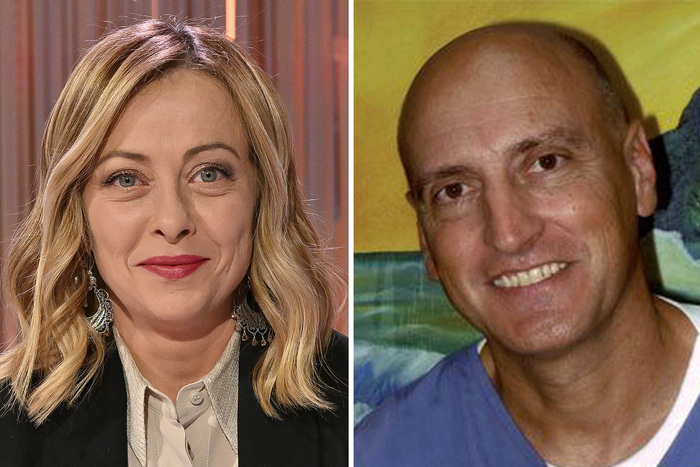Meghan reveals she suffered a miscarriage 0:48
(CNN) -
On a cold day in March 2019, I locked myself on the terrace of my apartment building in New York with a bottle of wine and a pack of old cigarettes that I hadn't smoked in years.
She was determined to take what little pleasure she could get in private in the open air, in a very public air.
In just one year I had been pregnant three times, but I didn't have a baby.
It was something she could barely register, no matter how many times she filled out the hospital admission forms.
Three pregnancies, zero children: a mistake, a horror, a wrong sum.
That night, I allowed myself to cry out loud as Manhattan glowed, unconscious, indifferent.
I looked at the sky, the street, the wine I hadn't drunk for months, the cigarettes I hadn't smoked for years, and I said to everyone and no one: "I give up."
Don't face miscarriage loss alone
The woman imprisoned for abortion in El Salvador speaks out 2:16
The first pregnancy had ended dramatically, horribly, on my bathroom floor.
The second was lost in the harsh silence of the black and white television in the ultrasound room at my doctor's office.
I heard the thud of a heartbeat through the walls of the next room, elusive music from a woman luckier than me.
The third, a whisper, disappeared a few weeks after announcing itself through the double joy and terror of the double pink line of the test.
She was 33 years old, healthy, practiced yoga every day and ate a nutritious and balanced diet.
How can this be happening?
advertising
Silence and unsolicited advice when a miscarriage occurs
Around me, friends and family announced their pregnancies, a seemingly endless series of shots of bumps on Instagram or ultrasounds brandished on FaceTime.
Seeing them resulted in a kind of wild envy that left me feeling as guilty as it was devastated.
Meanwhile, my days revolved around dawn blood draws at the fertility clinic, my desperate attempt to find out why my babies kept passing through me like ghosts.
Although I was fortunate to have a loving husband, family, and group of friends, hardly anyone knew what to say to me.
Many stumbled upon "I'm sorry" and left it there.
Much worse was the barrage of unsolicited advice, "tips," and inquiries about my eating and exercise habits.
Even more terrible were the people who seemed to know what not to say but weren't sure what to say.
This resulted in the worst possible outcome: silence.
I, on the other hand, suddenly couldn't shut up.
After my third miscarriage, something deep in my despair made me unable to lie.
I decided that if I couldn't get pregnant, I could at least be honest.
So I told everyone: my boss, my dentist, a stranger at a wedding after she asked me if I was "thinking about having kids."
And that's when something magical happened.
I realized that I was not alone.
My boss?
He had experienced it once before and was very sorry, did he need time off?
The dentist?
She had had four miscarriages before having her baby.
The godmother of the wedding?
Her miscarriage was on a horrible Christmas Eve in 2003, and she has never forgotten it.
He lights a candle every year with his three living daughters.
You are not alone
When I saw Chrissy Teigen's Instagram post, in which she shared photos showing the heartbreaking loss of her son, I had the feeling of wanting to put my arms around her and applaud her frankness.
He knew, even in the depths of his pain, the power to share his story.
Only then can we try to find the right words for such a loss.
So as we embark on Baby Loss Awareness Week, this is what I ask you to say and not say, based on my own experience and by those who so generously shared their stories with me.
One word of caution: Since no pregnancy or baby loss experience is universal, all may not be right to say (or hear).
But I'm listing them because maybe you're that woman on the deck, or maybe you know someone you need to get away from her.
You can try to help.
Here are some tips.
A new drug that seeks to treat postpartum depression
YOU MUST SAY: "Miscarriage is as much a part of pregnancy and motherhood as having a baby."
Pregnancy loss is devastatingly common.
You may think you don't know anyone who has had a miscarriage, but trust me, you do.
An estimated one in four women will miscarry, according to Tommy's, a UK charity focused on the loss of babies.
However, many doctors I have met along the way have told me that the actual number, in their clinical experience, is much higher.
My OB-GYN told me that about 50% of the women she saw on her first ultrasound did not have a viable pregnancy.
Yes, 50%!
Not all pregnancies end with birth and babies.
They still matter.
DO NOT SAY: "Have you thought about…?"
I cannot stress the importance of removing this phrase from your vocabulary.
Do you know what he's thinking about?
At your loss.
The pain settles, fog the heart.
This woman has spoken with medical professionals.
You've checked online message boards.
She has probably blamed herself.
Still, the questions "Have you thought about ...?"
This phrase is such a great plague that I have divided them into the three most persistent.
1. "Have you thought about taking a break?"
Do you know the one thing that is likely to calm a person who has just lost a much desired pregnancy?
Get pregnant again and have a baby.
Taking a break doesn't sound comforting.
It sounds like an even more agonizing wait, and this deeply unhelpful suggestion often only compounds the frustration.
Also, if "taking a break" is really the right thing to do for her, she may think that yes, she has already thought about it.
2. "Have you thought about adoption or in vitro fertilization?"
Both are immensely personal decisions that, in most cases, require enormous amounts of money, time, and in some cases a very specific medical prognosis.
If either option is right for someone, they will walk either of these great paths to a baby.
These questions, when addressed to someone who is just trying to get through the day with their pain, are overwhelming and anxiety provoking.
3. "Have you thought about acupuncture / giving up dairy / buying a very specific and expensive crystal from an ancient mountain range?"
Yes, you have.
She could have tried some of that already.
However, it still hasn't worked, right?
Save your crystals for yourself, please.
SHARE: Any pregnancy news by text message and acknowledge the person's experience when they share it.
It won't take away your joy
If you are pregnant, please understand that when you share your news with someone who has suffered a miscarriage, she will simultaneously feel happy for you while feeling a dagger directly to her heart.
This is normal.
At my lowest point, a new pregnancy announcement was an ambush that could leave me crying under the duvet for days.
On an intellectual level, I knew that the person did not have my baby.
However, it still hurt a lot.
When it comes to sharing pregnancy news, texting works great.
It allows the person to be able to process their emotions in private and at the same time respond with all the authentic and loving wishes they have for you.
Remember that your experience and that of your loved ones grieving can coexist.
Say it with me one more time: "Miscarriage is as much a part of pregnancy and motherhood as having a baby."
DO NOT SAY, "I don't know what to say" or "I can't imagine how you must feel."
These are useless phrases, which put the burden on the person who just shared something devastating with you.
When you say "God, this is so horrible, I don't know what to say," you said something.
The grieving person hears this: "Not only are things as bad as I thought, but now I have upset you a lot and I need to make you feel better."
Don't put that burden on her.
DON'T SAY, "Try not to stress" or "Stress causes miscarriage."
I couldn't believe how many well-meaning people told me variations on this phrase, a toxic cocktail of guilt and more guilt.
Miscarriage is stressful.
Terribly it is, and it can't be helped.
There is no evidence that stress causes miscarriage.
Do not say it.
DO NOT ASK: »Do you feel better?
The women who had a miscarriage were not sick.
Although in the course of their loss they may have been through immense pain.
They are heartbroken.
Physical recovery, although significant in some cases, is secondary to pain, which is immense and long-lasting.
There is also the tremendous work of dismantling the life that could have been, which takes time.
Medical bills to pay, appointments to be canceled, trying to get a refund for the expensive package of prenatal Pilates classes.
Remember also that the hormonal roller coaster that occurs after a pregnancy ends lasts for months.
SAY: "You will be happy again."
The unique agony of miscarriage is that it completely removes any sense of certainty on your way, in your body.
All you want to hear is that you will get pregnant and have your baby.
And of course that is not something that anyone can guarantee.
Therefore, having people look at you and say things with great certainty is very helpful.
A simple, "This is terrible now, but I promise you will be happy again," can be a one-sentence healing shower, especially if you've had a miscarriage.
There was also this: About a week after that night on the terrace, I found myself trusting, as I usually did at the time, on a perfect stranger at a party.
And he did the most amazing thing.
She looked me straight in the watery eyes and said something as simple as this: "Your baby is coming."
We hug.
I left.
A year later, almost the same date, my baby was born.
My daughter arrived on March 9, 2020, 3.1 kilograms, beautiful, supernaturally sunny, alive, alive, alive.
Over the past seven months in isolation, he has learned to sit up, hit my mother's piano keys with his furious baby fists, and suck cold apple slices between sore gums.
During this time, I am known for leniently describing it as a miracle, which, of course, it is not.
She is a normal by-product of the amazing amalgamation of luck and life and death that is the business of making and giving birth to babies.
From heartbreak to new life
My path was filled with anguish, but it was not unusual.
Sadly, nothing about miscarriage or loss of a baby is unusual.
But we must improve in caring for those who are going through it, supporting them and placing their pain front and center, where they belong and where we can best take care of them, out loud, generously, outside the culture of silence that exists and has become fierce. for so long.
You will make mistakes trying to love, reassure, and comfort your friends and family in the midst of their loss.
My suggestions may not work for you, but is that a reason not to try?
Please try it.
There is tranquility, there is hope.
There is so much to say.
- Alexandra King is a writer, filmmaker, and journalist for CNN's original video team.
Abortion Miscarriage









